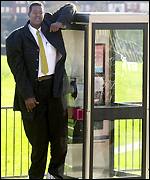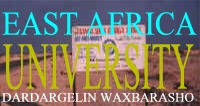|
. |
|
|
| Home | | | Free Webs | | | Your Email | | | TellFriend | | | Search | | | Feedback | | | | | Allah Is Great |
| w w w . s o m a l i t a l k . c o m |
|
| |||||||||||||||||||||||||||||||||||||||||||||||||||||
Until November the War against terrorism was the least of Mohamed Adan’s worries. The struggling Mogadishu businessman was more concerned about where to get credit for his mediumsized transport business, which ferries goods between Somalia and neighboring Kenya. Adan had just finished a business finished business proposal when the United States government named 62 organizations accused of being linked with Osama bin Laden’s el-Qaida network. Suddenly, for him, the anti-terrorism war didn’t seem so remote. Among the groups the US fingered was Al-Barakaat, a giant Somali money transfer bureau that Adan was preparing to approach for credit. “ I just froze when the Americans said Al-Barakat was linked to bin Laden,” said the middle-aged father of five.”When they seized the company’s assets everything fell apart”. But now Adan and all the other Somalis, there’s reason for new hope. Somalia’s first commercial bank since 1990 is expected to open its doors this month. The Universal Bank of Somalia (Ubsom) is a venture between Somali entrepreneurs and investors from Belgium, Ireland, Norway, and the Netherlands. Ubsom acting general manager Mahad Barkhadle says 51 percent of its shares are owned by Somalis. The bank’s headquarters will be in Brussels with an operational base in Dubai. Ubsom will have its main office in Somalia’s capital Mogadishu, where the shaky interim government led by president Abdulkassim Salat is based. Barkhadle says the bank has a starting capital of $10 million dollars and anticipates relations with 62 banks in 72 countries worldwide once operations kick off. Ubsom could prove a lifeline for struggling Somali entrepreneurs denied credit elsewhere and for humanitarian organizations and United Nations agencies, which previously used Al-Barakat. The new bank may also entice foreign investors who have shied away from Somalia due to the absence of financial services, economic legislation, regulatory frameworks and institutions to enforce standards. Somalia’s banking industry collapsed after Siad Barre’s regime was overthrown in a civil war in 1991. A decade later, the revival of financial sector remains elusive, though eight money transfer agencies have filled the void. Though Ubsom indicates it will start operations by issuing letters of credit cards to Somalia’s businessmen, it will also offer personal banking services - namely money transfer. Millions of Somalis have depended on remittances sent by relatives abroad as their sole means of survival since 1991. Insecurity, drought, an ineffective government and a ban on livestock imports from Somalia by Gulf states in 2000 have made it impossible for ordinary Somalis to pursue any serious business. Yassin Khalif, manager of Amal, a money transfer agency, says that 80 percent of Somalis have no source of income except remittances. When Washington blacklisted Al-Barakat, relief agencies and regional analysts protested, arguing that it was a death sentence for millions of Somalis. “Shutting down the Hawalad (Somali term for money transfer) is tantamount to condemning hundreds of thousand of Somalis to a slow death,”Said Khalif. Somalia’s eight remittance agencies moved between $200 million and $500 million a sum that dwarfed the $60 million pumped by humanitarian agencies. Ordinary Somalis, business people and some politicians consider the new bank an important milestone in Somalias sketchy financial setup, and view it as a timely cue to address the crisis caused by the collapse of Al-Barakat. Hawa Hassan is one person who has suffered from the collapse of Al-Barakat. The mother of six used to receive $150 every month from her brother in Canada, until the flow was interrupted. “It has been hard getting along and I hope things will now be better,”, she said, after learning of Ubsom. Al-Barakaat’s officials aren’t commenting on the new bank. Economists speculate that it may re-enter the fray- possibly under another name- after a UN Development Program project aimed at establishing a formal monetary framework in Somalia is established. The UN project will support economic research and the establishment of legitimate financial remittance services which could aid the new Somali bank. The program may also address criticisms that Ubsom has already faced. The bank’s debut started on a sour note after the head of the inactive Central Bank of Somalia termed it an “illegal establishment” because it had not applied for a license. Mahmud Muhammad Ulusow, the bank’s governor, said investors had ignored regulations governing the establishment and operations of banks in the country. However, Ulusow has indicated he is ready to work with any private financial institution local or foreign as long as it observes procedures. The Central Bank might be a legitimate authority in the country, but it doesn’t have so much clout outside Mogadishu- especially in the politically stable and economically vibrant Republic of Somaliland. The break away republic has its own central banks, Bank of Somaliland, which has been more active than its Mogadishu counterpart. WARLORD’S SON RIDING US WAVE.!
The 30-something man with the chiseled features and designer suit sounds as if he believes what he is saying about the United States of America-the nation that suffered one of its greatest ignominies in 1993 when American troops were in pursuit of his father. Times have changed since then. Hussein Mohamed Aidid, son of murdered Somali warlord General Mohamed Farah Aided, believes his hour has come and he plans to ride the crest of the anti-terror wave. “I am offering my help”, said the young militia strongman, his eyes flickering,. The chairman of the Somali Reconstruction and Restoration Council(SRRC) gives sermons from Ethiopian territory about the danger of Islamic fundamentalism in Somalia. “Al-Itihaad al Islamiya(The fundamentalist group) controls 80 percent of my country, the whole interim government is riddled with them),”he maintains. Aidid and other stalwarts from the SRRC have never acknowledged the transitional government under president Abdilkassim Salad Hassan, named at a peace conference in 2000. In the Ethiopian capital Addis Ababa they have set up their headquarters in a Hotel,. They are believed to have entertained visitors from America there several weeks ago. In its ardor to find allies Washington is said to be not shying away from making deals with warlords who have been jostling for power since 1991 ouster of dictator Siad Barre. “A US intervention like in Afghanistan could establish peace and stability in Somalia,”said Aidid. He subscribes to the CIA theory that there are links between the AlItihaad Islamists and Osama bin Laden’s el-Qaeda terror networks. “They don’t operate from camps but in mosques via so-called humanitarian organizations and industry.” “With contributions going into the millions of dollars and sponsored by Saudi Arabia, Libya, Egypt, Yemen and Qatar, their economic power in the Horn of Africa is on the rise.” Aidid claims Islamic fundamentalists control all the telephone companies in Somalia, the main Bakara market in the capital Mogadishu and 45 percent of sea trade. “Islamists trained in Medina and who belong to the (strictly orthodox) Wahabi movement are being systematically smuggled in order to turn Somalia into an Arab Islamic state”,. Aidid believes it is no coincidence that interim president Salat Hassan came out of exile in Egypt. “The somali people did not elect him. He’s an al-Itihaad man. For his part Salat hassan invited in the US army weeks ago, asking them to see for themselves that Mogadishu is not harboring terrorists. Whether that is the case or not international forces against terrorism are being marshaled around the Horn of Africa, among them 1 400 Germans and 2 000 US marines. Having US warships around is nothing unusual for Aidid who has an American passport and did military service with Marines during a 16-year sojourn in the US. In 1992 he arrived with the Marines as part of the operation”Restore Hope” in a bid to battle poverty in his homeland. The son of warlord Farah Aidid was astute enough to leave the country in time- on may 26 1993 before the situation escalated. Four months later his father taught America a lesson it has not forgotten. On October 18 he ordered the shooting down of three helicopters over Mogadishu. Eighteen Gis were killed and the bodies of several were dragged through the streets on camera and in front of a jeering crowd. Mohamed farah Aidid ordered three times that number of Americans killed. “I am sorry about the death of the Gis,” his son says today, hoping that the Americans come back to over come their trauma after eight years. FROM: SOWETAN DAILY NEWSPAPER. SOUTH-AFRICA,
GATHERED BY: SAEED FUURAA, Soomaalida Kudhaqan K/Afrika oo Dhibaatooyin Kala Kulma Booliska haga Gawaarida . Booliska ilaaliya sharciyadda wadooyinka oo ay beryahaan dambe iska horyimaadaan Soomaalida. . Carruurta Soomaalida Koonfur Afrika oo muujiyey dadaal waxbarasho Warbixinadaas Ka Akhri halkan Saeed Fuuraa
| |||||||||||||||||||||||||||||||||||||||||||||||||||||
Powered by www.SomaliTalk.com All About Somalia and More... | |||||||||||||||||||||||||||||||||||||||||||||||||||||
|
>> Kor/up >> Usheeg Asxaabtaada |
|||||||||||||||||||||||||||||||||||||||||||||||||||||


